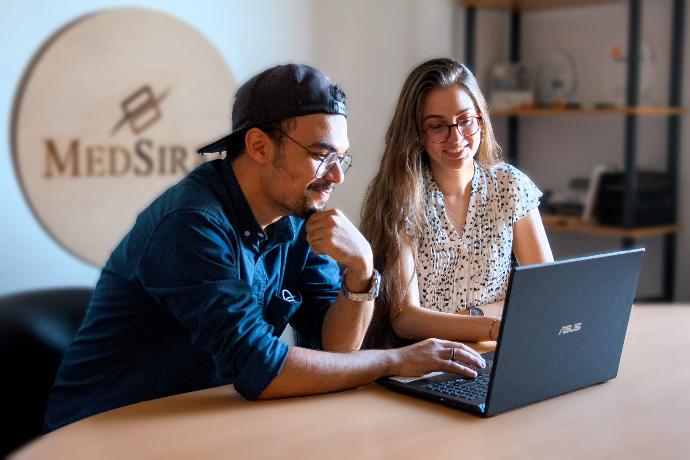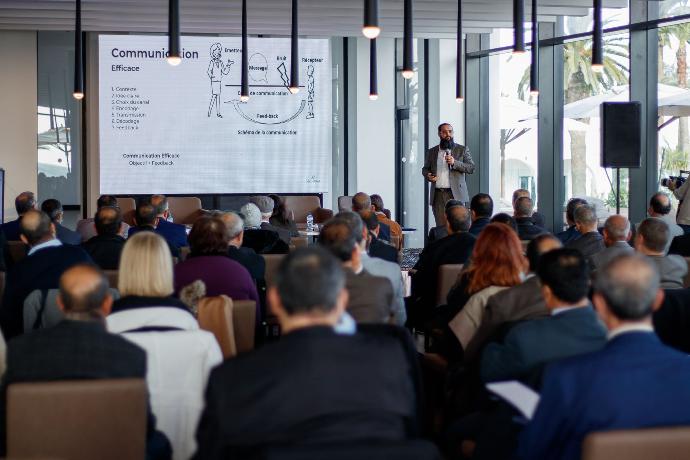Gloves Off is the new series of Private Round Tables organized by the consulting agency, MedSirat. The first edition which was elaborated in partnership with the Konrad Adenauer Foundation shed light on The role of the media in the development of the business climate in Tunisia. Several guests representing different types of organizations; actors from the entrepreneurial ecosystem and the media were present. On the Media side: Journalists, radio and TV producers and hosts, electronic and classic magazines, podcasters, and content creators. On the entrepreneurial ecosystem side: APII, PEEC, support structures, entrepreneurs, accelerators, and NGOs working on entrepreneurship and startups.
Granting people freedom of speech cannot be without cost. After the Tunisian Revolution, the prevalence of opinions in society on various matters blurred the line making it hard for everyone to distinguish between knowledge and ignorance.
To effectively address the latter issue, the Gloves Off round tables were held in a “private” setting with the attendance only of those who were capable of offering thoughtful reflections. The intent of the debate was clear:
Let us learn to speak out only when we have something worthwhile to say!
This is how Mr. Mohamed Rached Jomni, CEO of MedSirat, launched the debate.
Throughout the debate, effective communication skills emerged as vital for personal growth and pivotal for nurturing the potential of the broader entrepreneurial sector.
Indeed, the media has an essential duty to fulfill beyond the prevalent misconceptions and preconceived notions. It sought to encourage Tunisian students to learn more about entrepreneurship and foster an environment that supports their needs.
Despite Tunisia's dynamic environment, the media industry itself lags in terms of innovation and failed to adequately showcase the efforts and achievements of young entrepreneurs. Amidst these stagnations, Some media outlets have stepped forward to expose the vibrant startup scene in Tunisia offering a glimpse of hope.
It is equally important to provide startups with the resources and knowledge needed to ensure their development. Founders require guidance and support to navigate the intricate landscape of entrepreneurship, and the media can be a valuable ally in this endeavor. In other words, by providing startup founders with a platform to express themselves and their ideas, the media would become known as a catalyst for innovation and entrepreneurial growth. Meanwhile, it was, also, agreed upon that the media sector faces sustainability challenges due to its complex business model.
On the other hand, members of the second panel, which included representatives from the media industry, also concurred that effective communication lies at the heart of entrepreneurial success, as it enables startup owners to convey their vision, gain support, and attract customers. In fact, in the realm of communication, each medium possesses its unique advantages. Startup owners should recognize that no single channel can fully replace another. It is essential to understand the strengths and weaknesses of different communication platforms and tailor their strategies accordingly. Whether it is through traditional media outlets, social media platforms, or partnerships with influencers, startuppers must choose the channels that best align with their target audience and business objectives.
However, many startup entrepreneurs in Tunisia face communication issues, especially when it comes to press releases, radio interviews, and interviews. These obstacles lead to difficulties in managing startups’ public image and their interaction with the media. For instance, one of the significant issues is the insufficient knowledge about the selective nature of media coverage. Startup owners frequently neglect the importance of carefully organizing their media presence, which results in an overload of content that might not resonate with their audience.
Moreover, the difficulties faced by startups are made worse by their lack of financial resources. It can be challenging to set aside a sizable budget for media services, especially in the early stages of a project. Startup owners consequently encounter barriers to professional media support. Indeed, the challenges extend beyond startuppers themselves. The Tunisian system is often perceived as a roadblock to entrepreneurial success. Whether it is regulatory complexities, limited access to funding, or bureaucratic obstacles, these systemic barriers hinder the growth and prosperity of startups.
Like any other business, media outlets rely on advertising income and other sources to keep their doors open. While they recognize the value of covering startup stories, they also face the challenge of maintaining their financial viability. It takes collaboration as well as Mutual understanding between founders and media platforms to reach an appropriate balance between providing coverage and ensuring continuity. The ungratefulness of entrepreneurs is a circumstance worth mentioning. At the beginning of their journey, entrepreneurs are generally warmly welcomed and supported for free by the media, who highlight their innovative projects; However, once they achieve success, some of these entrepreneurs choose to abandon the media that initially supported them. Instead of maintaining these initial relationships, they now prefer to allocate their financial resources to advertising strategies such as urban displays or collaborating with influencers on social media platforms like Instagram. This change may appear disappointing for the media outlets that helped them gain visibility.
To address these issues at their core, universities must play a crucial role in equipping young entrepreneurs with the necessary skills. Marketing education and media literacy should be prioritized within entrepreneurship programs, allowing students to understand the power of effective communication. By fostering an understanding of media dynamics, interview techniques, and press release writing, universities can empower future startup owners to navigate the intricacies of the media landscape confidently.
In conclusion, Tunisia stands at a turning point, where the power of the media can shape the future of entrepreneurship. Accordingly, media organizations, entrepreneurs, and support structures must collaborate to develop and enhance the content and portrayal of the entrepreneurial ecosystem.


